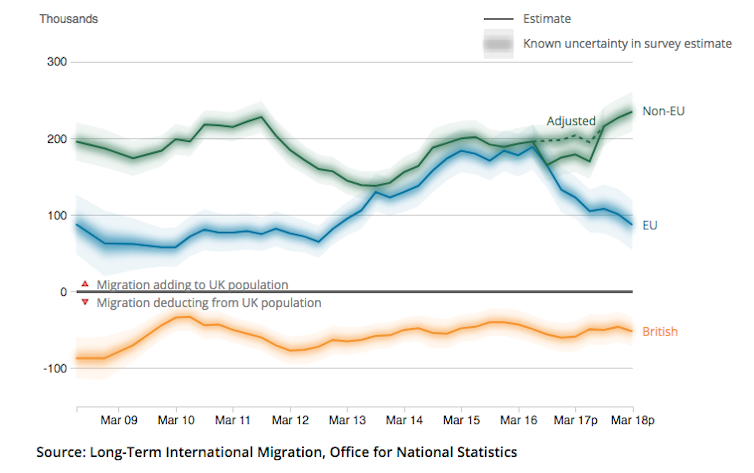As the deadline for a final Brexit deal approaches, close attention is being paid to statistics on the number of EU citizens living in Britain. In late August, after the Office for National Statistics published its latest long-term international migration estimates, news reports continued to talk of a “Brexodus” – the exodus of EU citizens from the UK ahead of Brexit. But such commentary, which is mirrored in academic debate, is overblown and it’s symptomatic of the assumptions made about how mobile the EU migrants who’ve made their homes in Britain actually are.
Brexit has provoked high levels of uncertainty about the future rights of EU citizens and their families. While the draft Withdrawal Agreement between the UK and the European Commission may have allayed some of those fears, the first batch of the government’s “no-deal Brexit” papers was silent on whether this agreement, and the Settlement Scheme that implements it, would still stand in the event of no deal.
Meanwhile, a recent inquiry predicted that reported hate crimes against migrants, which increased at the time of the referendum, could spike again around the point of the UK’s exit from the EU in March 2019.
The narrative of “Brexodus”, however, is far from accurate in capturing how EU citizen migrants are responding to this situation. As the latest estimates indicate, EU net migration – the number of people leaving subtracted from the number arriving – has fallen. At 87,000 it is now at its lowest level since 2012, and far below its peak of 189,000 in the year ending June 2016. But, the decline in the number of EU citizens arriving in the UK accounts for more of the fall in net migration than does a rise in the number leaving.

The number of EU citizens leaving the UK in the year ending March 2018 was 138,000. According to the ONS this number has: “Remained stable following a previous increase between the years ending September 2015 and September 2017.” So, we are not seeing a pattern of departures implied by the narrative of “Brexodus”.
Outflows are also very different depending on which countries EU citizens come from. Between the year ending March 2017 and that ending March 2018, there was a 21% increase in the number of departures among EU15 nationals – referring to the 15 member states of the EU until enlargement in 2004 – and a 19% increase in the number of departures of EU2 nationals, from Romania and Bulgaria. However, the increase in the number of departures of citizens from EU8 countries – those countries including Poland and Hungary which joined in 2004 – was significantly lower, at 4%.
EU citizen migrants are also applying for UK citizenship in increasing numbers: with over 11,000 applications in each of the first two quarters of 2018. This is the highest on record and around 2,000 more than in the respective periods in 2017.
The “Brexodus” narrative doesn’t capture these nuances and complexity because it is based on an inaccurate construction of migration under EU freedom of movement as “super mobile”. The assumption is that when circumstances change, people move on. The same assumption informs the UK government’s construction of EU migrants – as with migrants in general – as mobile and disposable, and the “Brexodus” narrative simply reinforces this.
Left to feel like ‘a floating log’
Our research is indicating, however, that there is a dissonance between migrants’ experiences and the assumptions being built into migration policy. EU migrants in the UK are rarely continually mobile, and despite the unsettling force Brexit presents to their personal and family biographies, moving on is not necessarily an option.
Brexit is clearly a potentially destabilising force in the lives of the 3m or so EU citizens resident in the UK. This was clear from a public Q&A event attended by 70 people in Sheffield on Brexit and the rights of EU nationals, which we helped organise in November 2017. Of those attending, 37 people from 14 different countries contributed written responses to the question: “What is your main concern for EU nationals in the UK after Brexit?”
One participant from Germany wrote: “Moving back to one’s home country is by no means straightforward due to housing issues, finding qualified work, getting into health insurance, transfer savings without double taxation.” While another participant, also from Germany wrote: “The UK makes me feel like a visitor but I have been here so long that the country of my origin is strange to me.”
For many, the Brexit process has provoked a deep sense of insecurity. As one person wrote: “It feels like being a floating log in the middle of the ocean.”
A more sophisticated way to understand how Brexit is influencing the decision-making of EU citizen migrants is needed than simply labelling it a “Brexodus”. Such an approach needs to acknowledge that decisions are shaped by inter-connected economic, political and personal considerations. Family relationships and responsibilities across the life course also influence migration or settling strategies. So it’s key that analysis of migration trends in the months and years to come go beyond the numbers to examine the multilayered processes and considerations likely to inform migrants’ decisions to move or stay.![]()